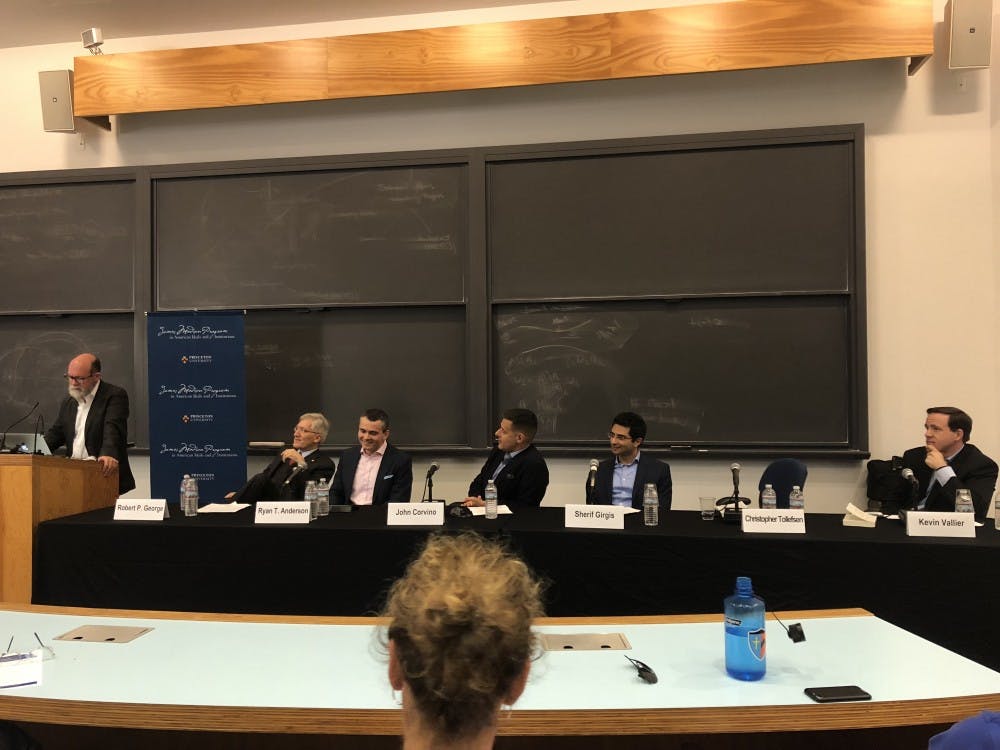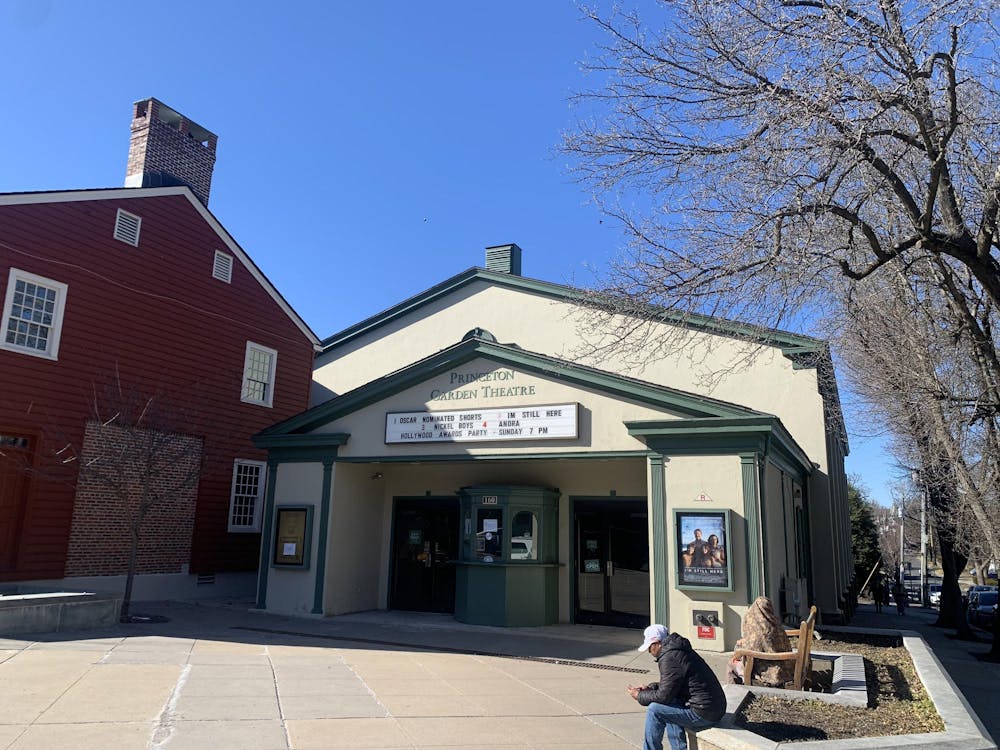On Wednesday, five philosophers debated where to draw the line between religious liberty and discrimination, using the high-profile pending Supreme Court case Masterpiece Cakeshop, Ltd. v. Colorado Civil Rights Commission as a case study.
The case concerns the right of a business to refuse services based on the First Amendment rights of freedom of speech and free exercise of religion. When Jack Phillips, the owner of a cake shop in Colorado, refused to bake a wedding cake for a gay couple due to his Christian beliefs, the couple said it was discrimination. Phillips maintained that baking a cake is an act of creative expression. The court held oral arguments last year and will likely reach a decision by the end of its term.
“[The decision] could come out at any moment,” said Robert P. George, McCormick Professor of Jurisprudence and Director of the James Madison Program in American Ideals and Institutions, who moderated the talk.
Last year, George and Sherif Girgis ’08 co-wrote an opinion piece in The New York Times arguing in favor of the shop owner’s right to deny the couple service. As a long-time advocate of traditional marriage, George, along with panelists Girgis and Ryan T. Anderson ’04, co-authored the book “What Is Marriage? Man and Woman: A Defense.”
John Corvino, a philosophy professor at Wayne State University, also known and self-described as the “Gay Moralist,” started the talk by addressing his new book, “Debating Religious Liberty and Discrimination.” He co-authored the book with fellow panelists Anderson and Girgis.
“People are sometimes surprised to hear me refer to [Anderson and Girgis] as my friends. They say, ‘How can you, as a LGBT rights advocate and a gay man yourself, be friends with Anderson and Girgis?’” Corvino began. “The answer to the question is really quite simple: I drink.”
Corvino said that he believes serious public questions deserve a thoughtful public dialogue, and that this dialogue happens best through friendship.
Regarding the Masterpiece Cakeshop case, he explained the challenges associated with upholding a variety of values. It is understandable that the gay couple would not like to hear that they cannot purchase a wedding cake, he said. At the same time, it is also understandable that Phillips, the owner, wanted to to conduct his business in a way that reflects his values.

Corvino reminded the audience that, in order to be in violation of Colorado’s law, Philips needed to have refused service on the basis of the customer’s sexual orientation. However, Phillips was willing to sell the couple other baked goods — just not a wedding cake.
Drawing an analogy from a case where Jews were taxed for wearing Yamakas, Corvino pointed out that the line between the use and the user is very thin.
“The activity is so closely connected to the protected status. Discrimination based on one is connected to discrimination based on another,” he said.
Corvino also reminded the crowd that the debate is not just about cakes, but about equal access in the public sphere.

Anderson, the William E. Simon Senior Research Fellow at The Heritage Foundation and the founder and editor of the publication Public Discourse, spoke next.
“Religious liberty is as American as apple pie. But so too is persecution and discrimination,” he said.
“What we’re now seeing in the United States is a form of progressive puritanism: people who have fought for the freedom to live their lives according to their deepest convictions, who are now using the law and the government to try to coerce other people into affirming their core convictions,” he said.
Anderson argued that the Masterpiece Cakeshop case bears similarity to the debate over abortion, since women can have right to an abortion, but physicians can simultaneously have a right to refuse to perform one. Anti-gay bigotry is wrong, Anderson said, but this is not a case of anti-gay bigotry.
He ended by quoting Supreme Court Justice Anthony Kennedy.
“‘Tolerance is essential in a free society.’ It seems to me that the state, in its position here, has neither been tolerant nor respectful of Mr. Phillips’ religious beliefs,” Anderson said.
Christopher Tollefsen, a philosophy professor at the University of South Carolina, spoke next.
Tollefsen saw the primary question as determining when it is permissible for the state to coerce an individual against their conscience.
“The state has very little epistemic authority to make determinations about the truth about this or that religion, or the legitimacy of the demands made by this or that religion,” he said. “Lacking such authority, [the state] needs to exercise restraint with regard to a number of judgments that private citizens are licensed to make.”
Kevin Vallier, an associate philosophy professor at Bowling Green State University, talked about “Debating Religious Liberty and Discrimination,” the new book written by Corvino, Anderson, and Girgis.
Discussing Corvino’s argument, Vallier noted that upgrading secular exemptions to religious exemptions in size and scope would produce a “swiss cheese legal system.” He suggested a moderately libertarian position. Instead of granting more exemptions, he recommended limiting government action to begin with.
His second criticism centered on Corvino’s equation of refusals with control and interference. The two are not the same, Vallier argued, and Corvino’s equation produces unsettling conclusions.
“If a boss fails to give an employee a raise, he has imposed a pay cut on her,” he said.
Vallier went on to discuss concerns he had with Anderson and Girgis’ argument. The problem, Vallier said, is that it presumes that supernatural goods do not override natural goods.
Discussing new natural law theory, Vallier pointed to a conflict between the good of religion and the supernatural.
“[The] majority of new natural law theorists are Catholic,” he said. “Jews and Muslims do not enjoy the eucharist, and that is a spectacular loss. Catholics enjoy special access to the sacraments.”
If we acknowledge supernatural goods case, Vallier said, Anderson and Girgis’ argument seems severely compromised.
Girgis, a graduate student in philosophy at the University, responded to Vallier.
He noted that people cannot act for the sake of supernatural goods, only for what they have access to, which are natural goods, and that restricting religious liberty means doing direct harm to the conditions for some people’s flourishing.
Responding to Tollefsen, Girgis said that though it is possible to determine that a state is not malicious and promotes a good, this is not the end of the discussion. He said that it is necessary to look at those affected by the law.
“They could be in a situation in which they have to pay a fine or do something contrary to their conscience,” he said. In some cases, a person is forced to pick between his integrity and a paying a fine, according to Girgis.
“There’s some reason to give you an exception,” he said, “even if your underlying belief is mistaken.”
He noted that if people only needed to grant exemptions for conscious claims they agreed with, they would not have to grant exemptions at all.
“Self-determination is at stake all the time,” he added.
Girgis concluded by speaking to the importance of integrity.
The lecture, “A License to Discriminate? Masterpiece Cakeshop, The First Amendment, and Antidiscrimination Law,” took place on Wednesday, May 9, 2018, at 4:30 p.m. in Lewis Library 120. It was a part of the James Madison Program’s series, “An America’s Founding and Future Lecture.”








